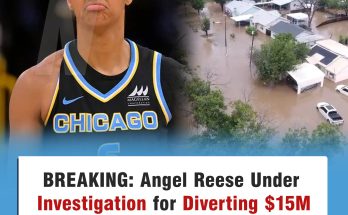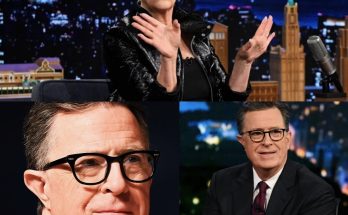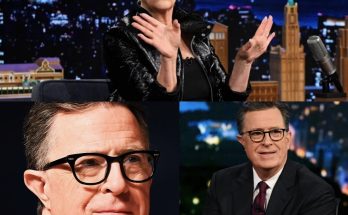In an unprecedented turn of events, WNBA sensation Caitlin Clark, the electrifying talent who’s dominated women’s basketball headlines with her incredible skill, has ignited a firestorm of controversy—but this time, it’s not for her awe-inspiring shots or triple-doubles. Instead, Clark has launched an explosive lawsuit against an ESPN reporter, accusing the network of deliberately twisting her words and perpetuating a racially charged smear campaign. This lawsuit has sent shockwaves through the sports world, casting a stark spotlight on how women athletes—particularly Black women—are portrayed and exploited by the media.
The Accusations That Rocked the Sports World
It all began with an ESPN segment that sent social media into a frenzy. The network implied Clark’s rapid rise to stardom was driven by her whiteness, painting her success as part of a problematic “white savior” narrative. The report went so far as to claim Clark intentionally distanced herself from her Black teammates, insinuating she exploited racial divisions for personal gain. Almost immediately, hashtags like #ClarkIsOverrated and #WNBAWhitePrivilege trended online, igniting a divisive and painful conversation about race, privilege, and media accountability.
But instead of quietly weathering the storm, Clark took an extraordinary stand. She swiftly filed a defamation lawsuit, alleging that ESPN deliberately edited her interview footage, removing critical context to portray her negatively. Her legal team argues this wasn’t a careless mistake but a calculated effort to distort her words and image to fuel controversy and ratings.

Clark’s Bold Response: “I Deserve Better—We All Do”
Responding publicly, Clark expressed deep frustration at the blatant misrepresentation and racialized criticism she received. “It’s disappointing,” Clark declared, with unwavering resolve. “Everybody deserves respect, and women in our league especially deserve that respect. People should never use my name to push divisive agendas.”
These words, delivered with sincerity and poise, underscored her genuine distress at seeing her image weaponized in a way that undermines the entire sport. Clark’s powerful statement resonated widely, especially among athletes who’ve seen their accomplishments overshadowed by manufactured scandals and clickbait journalism.
The Lawsuit Heard Round the World
Clark’s suit explicitly accuses ESPN of defamation and emotional distress, highlighting the deliberate and harmful manipulation of her public image. The lawsuit alleges that full, unedited interviews show Clark clearly expressing deep admiration and respect for her teammates and opponents. By selectively editing this footage, ESPN allegedly erased crucial context, falsely portraying her as racially insensitive and opportunistic.
Clark’s attorney put it bluntly: “This wasn’t sloppy journalism. It was a calculated hit job designed to create sensationalism and controversy at the expense of Caitlin’s reputation.”
Backlash, Support, and Social Media Storms
The public reaction to ESPN’s segment was immediate—and overwhelmingly intense. Fans of Clark quickly rallied behind her, launching the hashtag #StandWithCaitlin to voice solidarity. Basketball legends, including Hall of Famer Cheryl Swoops, also spoke out forcefully. Swoops tweeted, “Since when do we reduce great athletes to their race instead of their skills?”
Yet, critics quickly emerged, accusing Clark of exaggerating her claims or playing victim. But as the debate raged online, one thing became crystal clear: ESPN’s portrayal had deeply polarized public opinion and reopened critical conversations about race and gender in sports coverage.

Teammates and Stars Stand Behind Clark
Clark’s fellow athletes fiercely defended her integrity. Many publicly condemned ESPN’s portrayal, characterizing it as harmful, divisive, and undermining to the credibility of women’s sports. Prominent players and advocates highlighted the network’s decision as a betrayal, asserting it disrespected the very values of equality and unity the league stands for.
Subpoenas have been issued for ESPN internal communications, including emails and unseen footage, promising further revelations about how and why the segment aired in its edited form. The ensuing legal discovery process might soon expose deeper issues surrounding media accountability and truthfulness.
Media Manipulation vs. Genuine Achievement
The lawsuit brings renewed attention to the growing concern about media integrity, especially surrounding women athletes and women of color. It challenges the idea that sensationalism and clickbait narratives should overshadow genuine athletic achievements. Many have pointed out the irony that the network’s segment itself contributed to the very racial divides it purported to critique.
For Clark, the fight extends beyond personal vindication—it’s about holding powerful media outlets accountable for their role in shaping harmful, divisive narratives. Her lawsuit is rapidly becoming a symbol of broader issues plaguing sports media today.
ESPN’s Defensive Maneuvers
In response to mounting criticism and legal pressure, ESPN executives scrambled to mitigate damage. The network pulled the controversial segment from all platforms, hoping to quiet the storm. Yet clips continue circulating online, amplifying the controversy and underscoring the permanence of digital content. ESPN’s attempts to control the narrative may already be too late—the damage, many argue, has been done.
Sources within the network describe an atmosphere of panic and tension. Executives reportedly fear the lawsuit may expose damaging internal communications, undermining ESPN’s credibility on issues of race and gender representation. Rumors circulate about a possible quiet settlement, but Clark’s legal team is reportedly ready for a high-profile courtroom battle if necessary.
A Turning Point for Women’s Sports?
The legal drama unfolds at a critical juncture for women’s basketball, a sport experiencing unprecedented growth in popularity and recognition. Clark’s lawsuit has ignited broader discussions about racial equality, media ethics, and athlete representation. If she prevails, the case could set groundbreaking precedents for media accountability and fair representation of female athletes.
“This isn’t just about Caitlin Clark,” explained one advocate. “It’s about every athlete whose image and career have been damaged by media manipulation and sensationalism.”
As the case moves forward, Clark’s legal battle symbolizes a larger struggle for authenticity and justice. Her stance might empower other athletes to challenge harmful portrayals and hold powerful media entities accountable for irresponsible journalism.
Caitlin Clark’s Legacy Beyond Basketball
Regardless of the lawsuit’s ultimate outcome, Caitlin Clark’s courageous stand has already impacted sports culture deeply. Her willingness to confront powerful institutions, risk backlash, and fight publicly for truth and fairness marks her as more than just a remarkable athlete—it establishes her as a powerful advocate for change.
For Clark, basketball has always been about passion, integrity, and teamwork. Yet, now she finds herself in a very different spotlight—battling for truth and justice off the court. Win or lose, this legal fight ensures her legacy transcends mere athletic achievement, positioning her at the forefront of a critical conversation about media accountability, racial narratives, and fairness in women’s sports.
Clark’s case could forever change the landscape of sports media, forcing broadcasters and journalists to confront uncomfortable truths about sensationalism, exploitation, and the urgent need for honest, respectful coverage. For millions of supporters, Caitlin Clark is no longer just a sports star—she is a champion for truth and a fighter for justice, battling not just for herself, but for every athlete whose voice and integrity deserve to be respected.
As the sports world watches closely, Caitlin Clark’s lawsuit has sparked a crucial conversation that won’t easily fade. Her courage to challenge a media giant sends a powerful message that truth, integrity, and respect matter—both on and off the court.



